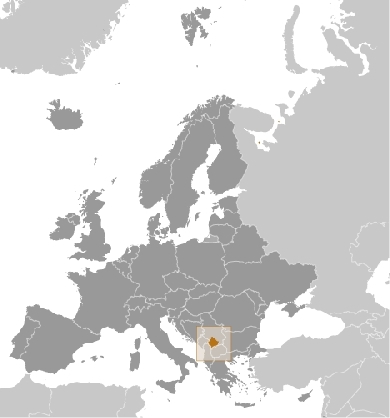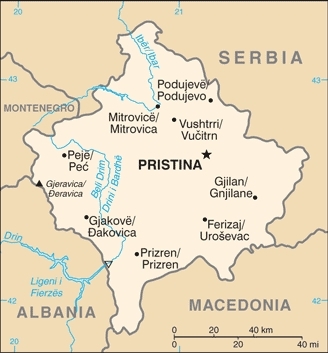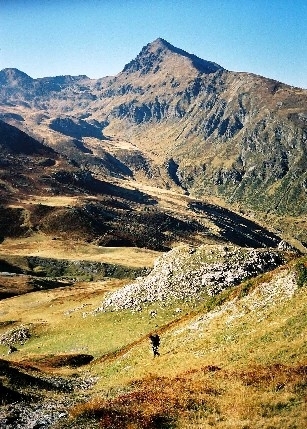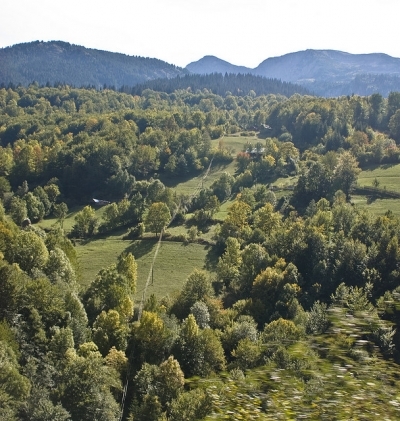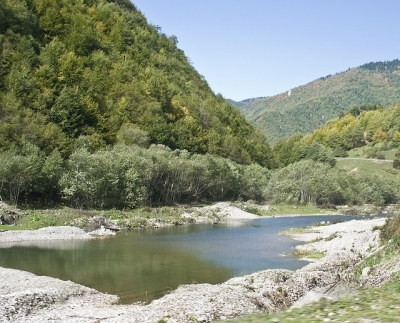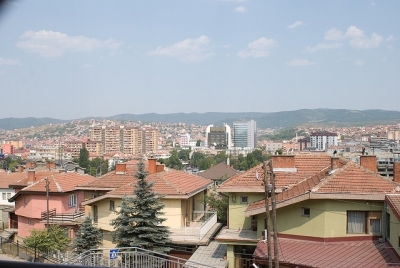Kosovo
Kosovo is a landlocked nation of just under two million people in southeast Europe, between Serbia, Macedonia, Albania, and Montenegro. Kosovo declared itself an independent nation, separate from Serbia, in 2008. Although recognized by many nations and international bodies, others do not formally recognize Kosovo as an independent nation, separate from Serbia.
The central Balkans were part of the Roman and Byzantine Empires before ethnic Serbs migrated to the territories of modern Kosovo in the 7th century. During the medieval period, Kosovo became the center of a Serbian Empire and saw the construction of many important Serb religious sites, including many architecturally significant Serbian Orthodox monasteries. The defeat of Serbian forces at the Battle of Kosovo in 1389 led to five centuries of Ottoman rule during which large numbers of Turks and Albanians moved to Kosovo.
By the end of the 19th century, Albanians replaced the Serbs as the dominant ethnic group in Kosovo.
Serbia reacquired control over Kosovo from the Ottoman Empire during the First Balkan War of 1912.
After World War II, Kosovo became an autonomous province of Serbia in the Socialist Federal Republic of Yugoslavia (S.F.R.Y.) with status almost equivalent to that of a republic under the 1974 S.F.R.Y. constitution.
Despite legislative concessions, Albanian nationalism increased in the 1980s, which led to riots and calls for Kosovo's independence. At the same time, Serb nationalist leaders, such as Slobodan Milosevic, exploited Kosovo Serb claims of maltreatment to secure votes from supporters, many of whom viewed Kosovo as their cultural heartland. Under Milosevic's leadership, Serbia instituted a new constitution in 1989 that revoked Kosovo's status as an autonomous province of Serbia. Kosovo Albanian leaders responded in 1991 by organizing a referendum that declared Kosovo independent.
Under Milosevic, Serbia carried out repressive measures against the Albanians in the early 1990s as the unofficial Kosovo government, led by Ibrahim Rugova, used passive resistance in an attempt to try to gain international assistance and recognition of an independent Kosovo. Albanians dissatisfied with Rugova's passive strategy in the 1990s created the Kosovo Liberation Army and launched an insurgency. Starting in 1998, Serbian military, police, and paramilitary forces under Milosevic conducted a brutal counterinsurgency campaign that resulted in massacres and massive expulsions of ethnic Albanians. Approximately 800,000 Albanians were forced from their homes in Kosovo during this time. International attempts to mediate the conflict failed, and Milosevic's rejection of a proposed settlement led to a three-month NATO military operation against Serbia beginning in March 1999 that forced Serbia to agree to withdraw its military and police forces from Kosovo.
UN Security Council Resolution 1244 (1999) placed Kosovo under a transitional administration, the UN Interim Administration Mission in Kosovo (UNMIK), pending a determination of Kosovo's future status.
A UN-led process began in late 2005 to determine Kosovo's final status. The negotiations ran in stages between 2006 and 2007, but ended without agreement between Belgrade and Pristina.
On 17 February 2008, the Kosovo Assembly declared Kosovo independent. Since then, over 70 countries have recognized Kosovo, and it has joined the International Monetary Fund and World Bank.
Serbia with several other states protest the US and other states' recognition of Kosovo's declaring itself as a sovereign and independent state in February 2008. Serbia sought an advisory opinion from the International Court of Justice (ICJ) on the legality under international law of Kosovo's declaration of independence. The ICJ released the advisory opinion in July 2010 affirming that Kosovo's declaration of independence did not violate general principles of international law, UN Security Council Resolution 1244, or the Constitutive Framework. The opinion was closely tailored to Kosovo's unique history and circumstances. Ethnic Serbian municipalities along Kosovo's northern border challenge final status of Kosovo-Serbia boundary. Several thousand NATO-led KFOR peacekeepers under UNMIK authority continue to keep the peace within Kosovo between the ethnic Albanian majority and the Serb minority in Kosovo. Kosovo and Macedonia completed demarcation of their boundary in September 2008
Contents
Geography
Location: Southeast Europe, between Serbia and Macedonia
|
The Koshare mountain region in Kosovo. Photo taken in 2000 or 2001. Source: Michelle Walz/Flickr |
|
Kosovo Mountains. Source: Andreas Welch/Flickr |
|
Kosovo Mountain lake. Source:[1]Andreas Welch/Flickr |
|
Pristina. Source:[2]Andreas Welch/Flickr |
Geographic Coordinates: 42 35 N, 21 00 E
Area: 10,887 sq km
Land Boundaries: 702 km (Albania 112 km, Macedonia 159 km, Montenegro 79 km, Serbia 352 km)
Terrain: flat fluvial basin with an elevation of 400-700 m above sea level surrounded by several high mountain ranges with elevations of 2,000 to 2,500 m. The highest point is Gjeravica/Deravica (2,656 m) and the lowest point is Drini i Bardhe/Beli Drim (297 m) (both are located on the border with Albania).
Climate: influenced by continental air masses resulting in relatively cold winters with heavy snowfall and hot, dry summers and autumns; Mediterranean and alpine influences create regional variation; maximum rainfall between October and December
Natural Resources: nickel, lead, zinc, magnesium, lignite, kaolin, chrome, bauxite
Ecology and Biodiversity
Ecologically. Kosovo is included within the Balkan mixed forests ecoregion.
People and Society
Population: 1,836,529 (July 2012 est.)
Ethnic Groups: Albanians 92%, other (Serb, Bosniak, Gorani, Roma, Turk, Ashkali, Egyptian) 8% (2008)
Age Structure:
0-14 years: 27.2% (male 258,078/female 237,987)
15-64 years: 66.1% (male 630,350/female 576,946)
65 years and over: 6.7% (male 51,668/female 70,603) (2011 est.)
Languages: Albanian (official), Serbian (official), Bosnian, Turkish, Roma
Literacy (age 15 and over can read and write): 91.9% (2007 Census)
History
Kosovo has been inhabited since the Neolithic Era. During the medieval period, Kosovo was the center of the Serbian empire and saw the construction of many important Serb religious sites, including many architecturally significant Serbian Orthodox monasteries. It was the site of a 14th-century battle in which invading Ottoman Turks defeated an army led by Serbian Prince Lazar.
The Ottomans ruled Kosovo for more than 4 centuries, until Serbia reacquired the territory during the First Balkan War in 1912-13. First partitioned in 1913 between Serbia and Montenegro, Kosovo was then incorporated into the Kingdom of the Serbs, Croats, and Slovenes (later named Yugoslavia) after World War I. During World War II, parts of Kosovo were absorbed into Italian-occupied Albania. After the Italian capitulation, Nazi Germany assumed control over Kosovo until Tito's Yugoslav Partisans entered at the end of the war.
After World War II, Kosovo became an autonomous province of Serbia in the Socialist Federal Republic of Yugoslavia (S.F.R.Y.). The 1974 Yugoslav Constitution gave Kosovo (along with Vojvodina) the status of a Socialist Autonomous Province within Serbia. As such, it possessed rights nearly equal to the six constituent Socialist Republics of the S.F.R.Y. In 1981, riots broke out and were violently suppressed after Kosovo Albanians demonstrated to demand that Kosovo be granted full Republic status.
The Kosovo Conflict and NATO Intervention
In the late 1980s, Slobodan Milosevic propelled himself to power in Belgrade by exploiting Serbian nationalism and the question of Kosovo. In 1989, he eliminated Kosovo's autonomy and imposed direct rule from Belgrade. Belgrade ordered the firing of most ethnic Albanian state employees, whose jobs were then assumed by Serbs.
In response, Kosovo Albanian leaders began a peaceful resistance movement in the early 1990s, led by Ibrahim Rugova. They established a parallel government funded mainly by the Albanian diaspora. When this movement failed to yield results, an armed resistance emerged in 1997 in the form of the Kosovo Liberation Army (KLA). The KLA's main goal was to secure the independence of Kosovo.
In late 1998, Milosevic unleashed a brutal police and military campaign against the KLA, which included widespread atrocities against civilians. As Milosevic's ethnic cleansing campaign progressed, over 800,000 ethnic Albanians were forced from their homes in Kosovo. Intense international mediation efforts led to the Rambouillet Accords, which called for Kosovo autonomy and the involvement of NATO troops to preserve the peace. Milosevic's failure to agree to the Rambouillet Accords triggered a NATO military campaign to halt the violence in Kosovo. This campaign consisted primarily of aerial bombing of the Federal Republic of Yugoslavia (F.R.Y.), including Belgrade, and continued from March through June 1999. After 78 days, Milosevic capitulated. Shortly thereafter, the UN Security Council adopted Resolution 1244 (1999), which suspended Belgrade's governance over Kosovo, established the United Nations Interim Administration Mission in Kosovo (UNMIK), and authorized a NATO peacekeeping force. Resolution 1244 also envisioned a political process designed to determine Kosovo's future status.
As ethnic Albanians returned to their homes, elements of the KLA conducted reprisal killings and abductions of ethnic Serbs, Roma, and, to a limited extent, other minorities in Kosovo. Thousands of ethnic Serbs, Roma, and other minorities fled from their homes during the latter half of 1999, and many remain displaced.
Kosovo Under UN Administration
The UN established the UN Interim Administration Mission in Kosovo (UNMIK), under the control of a Special Representative of the Secretary General (SRSG). In 2001, UNMIK promulgated a constitutional framework that provided for the establishment of Provisional Institutions of Self-Government (PISG).
Under UNMIK's guidance, Kosovo established new institutions (both at the municipal and central levels), held free elections, and established a multi-ethnic Kosovo Police Service (KPS). The KLA was demobilized, with many of its members incorporated into the Kosovo Protection Corps (KPC), a civilian emergency services organization. UNMIK gradually turned over more governing competencies to local authorities.
In March 2004, Kosovo experienced its worst inter-ethnic violence since the Kosovo war. The unrest in 2004 was sparked by a series of minor events that soon cascaded into large-scale riots. Kosovo Serb communities and Serbian Orthodox churches were targeted in the violence.
In October 2004, Kosovo held elections for the second 3-year term of the Kosovo Assembly. For the first time, Kosovo's own Central Election Commission administered these elections, under Organization for Security and Cooperation in Europe (OSCE) guidance. The main ethnic Albanian political parties were the same as in the 2001 elections, but with the addition of the new party ORA, led by Veton Surroi, and two new Kosovo Serb parties: the Serbian List for Kosovo and Metohija (SLKM) led by Oliver Ivanovic, and the Citizens Initiative of Serbia led by Slavisa Petkovic. In contrast to the previous Kosovo Government, this election produced a "narrow" coalition of two parties, the LDK and AAK. The December 3, 2004 inaugural session of the Kosovo Assembly re-elected Ibrahim Rugova as President and Ramush Haradinaj as Prime Minister.
In March 2005, Haradinaj resigned as Prime Minister after being indicted for war crimes by the International Criminal Tribunal for the former Yugoslavia (ICTY); Haradinaj voluntarily surrendered to authorities and traveled to The Hague to face charges. (Haradinaj was acquitted of all charges on April 3, 2008, but ICTY's Office of the Prosecutor successfully appealed the acquittal and the ICTY ordered a partial re-trial that started August 18, 2011 and continues. Haradinaj is in custody in The Hague.) The Kosovo Assembly subsequently elected Bajram Kosumi (AAK) as Prime Minister; Kosumi's resignation in March 2006 led to his replacement by Agim Ceku. After President Rugova's death in January 2006, he was succeeded by Fatmir Sejdiu.
Kosovo's Status Process
After 6 years of international administration, Kosovo Albanian authorities continued to press the international community to begin a process to define Kosovo's future status.
In 2005, a UN envoy, Norwegian diplomat Kai Eide, was appointed to review progress in Kosovo. Eide reported that there was no advantage to be gained by further delaying a future status process.
In November 2005, the Contact Group (France, Germany, Italy, Russia, the United Kingdom, and the United States) produced a set of "Guiding Principles" for the resolution of Kosovo's future status. Key principles agreed by the Contact Group included: no return to the situation prior to 1999, no changes in Kosovo's borders, and no partition or union of Kosovo with a neighboring state. The Contact Group later said that Kosovo's future status had to be acceptable to the people of Kosovo.
The Ahtisaari Process
In November 2005, United Nations Secretary General Kofi Annan appointed Martti Ahtisaari, former president of Finland, to lead a future status process. Special Envoy Ahtisaari's diplomatic efforts addressed a broad range of issues important to Kosovo's future, including decentralizing local government, protecting cultural and religious heritage in Kosovo, economic issues, and safeguarding the rights of minorities. Over the course of 2006 and early 2007, Ahtisaari brought together officials from Belgrade and Pristina to discuss these practical issues and the question of status itself.
Ahtisaari subsequently developed a comprehensive proposal for Kosovo's future status, which set forth a series of recommendations on Kosovo's democratic governance and substantial protections for minorities. Ahtisaari also recommended that Kosovo become independent, subject to a period of international supervision. He proposed that a new International Civilian Office (ICO) be established to supervise Kosovo's implementation of its obligations under the Ahtisaari Plan. A European Union (EU)-led rule of law mission (subsequently named EULEX) would also be deployed to focus on the police and justice sector, while a NATO-led stabilization force would continue to provide for a safe and secure environment. Pristina accepted the Ahtisaari recommendations, but Belgrade rejected them.
On April 3, 2007, Ahtisaari presented his plan to the UN Security Council. Due to Russian opposition, the Security Council could not reach agreement on a new Security Council resolution that would pave the way for the implementation of the Ahtisaari recommendations.
After several months of inconclusive discussions in the Security Council, the Contact Group agreed to support a new period of intensive engagement to try to find an agreement between Belgrade and Pristina on Kosovo's status. A "Troika" of representatives from the European Union, the Russian Federation, and the United States began this effort in August 2007. UN Secretary General Ban Ki-moon asked them to report on their efforts no later than December 10, 2007. The German ambassador to the United Kingdom, Wolfgang Ischinger, represented the EU; Alexander Botsan-Kharchenko represented the Russian Federation; and Ambassador Frank Wisner represented the United States.
After an intense series of Troika-led negotiations, including a high-level conference in Baden, Austria, the Troika's mandate ended in December 2007 without an agreement between the parties. In its final report, the Troika stated that it had explored with the parties every realistic option for an agreement, but that it was not possible to find a mutually acceptable outcome.
Independence
Kosovo declared its independence from Serbia on February 17, 2008. In its declaration of independence, Kosovo committed to fulfilling its obligations under the Ahtisaari Plan and embraced multi-ethnicity as a fundamental principle of good governance, welcoming a period of international supervision.
The United States formally recognized Kosovo as a sovereign and independent state on February 18, 2008. As of October 2011, over 80 countries had recognized Kosovo's independence, including 22 of 27 EU member states, all of its neighbors (except Serbia), and other states from the Americas, Africa, and Asia.
Shortly after independence, a number of states established an International Steering Group (ISG) for Kosovo that appointed Dutch diplomat Pieter Feith as International Civilian Representative (ICR) and head of the International Civilian Office (ICO), charged with ensuring Kosovo’s implementation of the Ahtisaari Plan and supporting Kosovo’s European integration.
As part of its commitment to the Ahtisaari Plan, the Kosovo Government rapidly enacted after independence laws on minority protection, decentralization, special protection zones for Serb cultural and religious sites, local self-government, and municipal boundaries.
The Kosovo Assembly approved a constitution in April 2008, which entered into force on June 15, 2008. ICR Feith certified that the constitution was in accordance with the Ahtisaari Plan. At the time of certification, ICR Feith also congratulated Kosovo on a modern constitution that "provides comprehensive rights for members of communities as well as effective guarantees for the protection of the national, linguistic and religious identity of all communities." More information on the role of the ICO in Kosovo can be found at: http://www.ico-kos.org/.
Post-Independence
In 2008, the North Atlantic Council authorized NATO’s Kosovo Force (KFOR) to initiate Ahtisaari-recommended tasks to supervise the dissolution of the Kosovo Protection Corps (KPC) and to supervise and support the stand-up of a multi-ethnic, civilian-controlled Kosovo Security Force (KSF). KFOR coordinates with EULEX and the Kosovo Police as third responder to security events as well as with other international institutions to support the development of a stable, democratic, multi-ethnic, and secure Kosovo. U.S. KFOR’s area of responsibility encompasses a number of significant Kosovo Serb enclaves in Kosovo. It has made a concerted effort to build confidence in local communities, supporting local infrastructure improvements such as building a new community center and reaching out to local leaders in person and on Serb radio and TV.
The KPC was deactivated on January 20, 2009, and officially dissolved on June 14, 2009. The KSF was activated on January 21, 2009, with Lt. General Sylejman Selimi as the commander and the selection of 1,400 KPC members to join the KSF. KFOR began the process of organizing, training, and equipping the new force, as well as recruiting multi-ethnic personnel to join the KSF. The KSF and its ministry reached initial operating capability in September 2009.
On December 9, 2008, the EU rule of law mission, EULEX, reached initial operating capability by deploying more than 1,000 police, judges, prosecutors, and customs officers throughout Kosovo. As EULEX ramped up, UNMIK ended its police role in Kosovo and scaled back its presence drastically, as directed by UN Secretary General Ban Ki-Moon. EULEX reached full operational capability in April 2009.
In 2009, NATO decided to begin downsizing KFOR, through a conditions-based assessments of an improved security and political situation in Kosovo. KFOR completed the first phase of downsizing in early 2010, bringing troop levels to approximately 10,000. Based on the improving security situation in Kosovo, in March 2011 KFOR completed the second phase of downsizing, bringing troop levels to approximately 6,200, plus a temporarily-deployed operational reserve force
In October 2008, Serbia requested an International Court of Justice (ICJ) advisory opinion on the legality of Kosovo’s declaration of independence. Written briefs were presented by 36 countries in April 2009 and by 14 countries in July 2009, with oral statements offered in December 2009. The ICJ released the advisory opinion on July 22, 2010, affirming that Kosovo’s declaration of independence did not violate general principles of international law, UN Security Council Resolution 1244, or the Constitutive Framework. The opinion was closely tailored to Kosovo’s unique history and circumstances.
In March 2011, the EU launched a facilitated dialogue between Kosovo and Serbia with the declared goals of promoting cooperation and good neighborly relations, achieving progress on the path to Europe, and improving the lives of the people. As of December 2011, agreements had been reached on issues including customs stamps, university diplomas, civil registries, land records, and cross-border freedom of movement. The parties also reached an agreement on integrated border management, whose implementation awaits conclusion of a technical protocol.
Government
On June 15, 2008, Kosovo's constitution came into force. Under the constitution, the President of Kosovo is the head of state and serves a term of 5 years with the right to one re-election. The Prime Minister is the head of government and is elected by the Kosovo Assembly.
The unicameral Kosovo Assembly consists of 120 seats, 10 of which are reserved for ethnic Serbs, and 10 for other minorities (4 seats for the Roma, Ashkali, and Egyptian communities [RAE], 3 seats for the Bosniak community, 2 seats for the Turkish community, and 1 seat for the Gorani community). Three of the remaining 100 seats are also held by minority members (for a total of 13). All members serve 4-year terms. Jakup Krasniqi (PDK) is Speaker of the Assembly.
The main political parties in Kosovo include the Democratic League of Kosovo (LDK), formerly led by Ibrahim Rugova and now led by Pristina Mayor Isa Mustafa; Democratic Party of Kosovo (PDK), led by Kosovo Prime Minister Hashim Thaci; the Alliance for the Future of Kosovo (AAK), led by former Prime Minister Ramush Haradinaj; New Kosovo Alliance (AKR), led by Behgjet Pacolli; and Vetevendosje (“Self Determination”), led by Albin Kurti.
Kosovo under UNMIK administration held its first parliamentary elections in November 2001. After significant political wrangling, politicians agreed to establish a coalition government in March 2002, with Bajram Rexhepi (PDK) as Prime Minister and Ibrahim Rugova (LDK) as President. In the same year, the Kosovo Assembly began to function and pass its first laws. Beginning in 2003, UNMIK began transferring governing competencies to these ministries.
On November 17, 2007, Kosovo held parliamentary and municipal elections. These elections were deemed free and fair by international observers. The PDK won 34.3% of the vote, the LDK won 22.6%, the New Kosovo Alliance won 12.3%, the Democratic League of Dardania won 10%, and the AAK won 9.6%. Smaller minority parties also made some small gains. These elections led to a coalition between the LDK and the PDK and to the nomination of Hashim Thaci as Prime Minister of Kosovo. Under pressure from Belgrade, most Kosovo Serbs boycotted the vote.
In June 2008, UN Secretary General Ban decided to "reconfigure" UNMIK and reduce the size of the UN presence in Kosovo, effectively ending the UN's role as administrator of Kosovo and welcoming EU deployment of its rule of law mission (EULEX). As Ban stated in his report to the Security Council, "UNMIK will no longer be able to perform effectively the vast majority of its tasks as an international administration." The EU assumed responsibilities in the areas of policing, justice, and customs throughout Kosovo.
Kosovo administered its first elections since independence on November 15, 2009. These local elections were held in 36 municipalities, including one expanded and three new Serb-majority municipalities established under the decentralization process of the Ahtisaari plan. International observers from the EU, non-governmental organizations (NGOs), and the ICO agreed the elections were conducted largely in accordance with international standards and that the irregularities that took place were insufficient to affect the outcome of the poll. Voter turnout was the highest since 2002, including in majority ethnic-Serb communities south of the River Ibar. However, voter participation in northern Kosovo was extremely low, with Kosovo Serb communities boycotting the elections. For the first time, Kosovo authorities in the Central Election Commission certified the election results, rather than the pre-independence practice whereby UNMIK certified results. In June 2010, the municipality of Partesh held its first mayoral election, which drew more than 65% of eligible Kosovo Serb voters. There is one remaining Serb-majority municipality to be established through the decentralization process--North Mitrovica. The North Mitrovica Municipal Preparation Team is currently working under the supervision of the ICO to prepare the municipality for elections and formal establishment.
2010 National Elections 'and' Election of President Jahjaga
On September 22, 2010, the Kosovo Constitutional Court ruled that President Sejdiu had violated the constitution by simultaneously holding the position of president and president of his political party, the Democratic League of Kosovo (LDK). On September 27, Sejdiu resigned as President of the Republic, retaining his post as head of the LDK party until he was unseated in the November 2010 internal party elections. Speaker of the Assembly Jakup Krasniqi became acting President, in accordance with the constitution. On October 16, in response to deteriorating coalition relations following Sejdiu’s resignation, LDK and its ministers pulled out of the governing coalition, leaving Prime Minister Thaci and his party heading a minority government and leading to calls for early parliamentary elections. On November 2, the Kosovo Assembly approved a no-confidence motion against Prime Minister Thaci, and Kosovo held extraordinary elections on December 12, 2010. International observers called the elections relatively efficient and effective. However, there were serious irregularities in some municipalities, where the Central Election Commission ordered re-votes in January 2011. Final results were certified February 7, 2011, with PDK maintaining its plurality at 32% of the vote. LDK won 24.7% of the vote, Vetevendosje won 12.7%, AAK won 11%, and AKR won 7.3%. Following 2 weeks of negotiations, Hashim Thaci formed a government with AKR, the sole elected deputy of “Rugova’s List,” and the ethnic minority political parties. Per a coalition agreement, the Assembly elected Behgjet Pacolli as the new president and approved a new coalition government, led by Prime Minister Hashim Thaci, on February 22, 2011. However, a March 30 Constitutional Court decision held the Assembly’s election of the president unconstitutional on procedural grounds. Pacolli resigned, and on April 7, 2011, the Assembly elected Atifete Jahjaga, the first female to hold the office of President of the Republic.
Government Type: Republic
Capital: Pristina (Prishtine, Prishtina)
Other Major Cities:
Administrative divisions: 37 municipalities (komunat, singular - komuna in Albanian; opstine, singular - opstina in Serbian); Decan (Decani), Dragash (Dragas), Ferizaj (Urosevac), Fushe Kosove (Kosovo Polje), Gjakove (Dakovica), Gjilan (Gnjilane), Gllogovc/Drenas (Glogovac), Gracanice (Gracanica), Hani i Elezit (Deneral Jankovic), Istog (Istok), Junik, Kacanik, Kamenice/Dardana (Kamenica), Kline (Klina), Kllokot-Verboc (Klokot-Vrbovac), Leposaviq (Leposavic), Lipjan (Lipljan), Malisheve (Malisevo), Mamushe (Mamusa), Mitrovice (Mitrovica), Novoberde (Novo Brdo), Obiliq (Obilic), Partesh (Partes), Peje (Pec), Podujeve (Podujevo), Prishtine (Pristina), Prizren, Rahovec (Orahovac), Ranillug (Ranilug), Shterpce (Strpce), Shtime (Stimlje), Skenderaj (Srbica), Suhareke (Suva Reka), Viti (Vitina), Vushtrri (Vucitrn), Zubin Potok, and Zvecan. Note - the Government of Kosovo has announced that the current Mitrovice (Mitrovica) municipality is to be split into Mitrovice (Mitrovica) North and Mitrovice (Mitrovica) South
Independence Date: 17 February 2008 (from Serbia)
Legal System: Kosovo accepts compulsory International Court of Justice (ICJ) jurisdiction; and accepts International criminal court (ICCt) jurisdiction. The Kosovo judicial system started adapting to the new legal charter on June 15, 2008. Supreme Court judges and prosecutors, district court judges, and municipal courts judges already appointed by the SRSG will continue to serve in their posts until the expiry of their appointment. Following the December 2008 transfer of rule of law functions to the Government of Kosovo, the Kosovo Judicial Council (KJC) has proposed to the President of Kosovo candidates for appointment or reappointment as judges and prosecutors.
Economy
Over the past few years Kosovo's economy has shown significant progress in transitioning to a market-based system and maintaining macroeconomic stability, but it is still highly dependent on the international community and the diaspora for financial and technical assistance. Remittances from the diaspora - located mainly in Germany, Switzerland, and the Nordic countries - are estimated to account for about 13-15% of GDP, and donor-financed activities and aid for another 7.5%.
Kosovo's citizens are the poorest in Europe with an average annual per capita income (PPP) of $6,500.
Unemployment, around 45%, is a significant problem that encourages outward migration and black market activity.
Most of Kosovo's population lives in rural towns outside of the capital, Pristina. Inefficient, near-subsistence farming is common - the result of small plots, limited mechanization, and lack of technical expertise.
With international assistance, Kosovo has been able to privatize 50% of its state-owned enterprises (SOEs) by number, which represents a majority of SOE assets.
Minerals and metals - including lignite, lead, zinc, nickel, chrome, aluminum, magnesium, and a wide variety of construction materials - once formed the backbone of industry, but output has declined because of ageing equipment and insufficient investment.
A limited and unreliable electricity supply due to technical and financial problems is a major impediment to economic development, but Kosovo has received technical assistance to help improve accounting and controls.
The US Government is cooperating with the Ministry for Energy and Mines and the World Bank to prepare a commercial tender for a project to include construction of a new power plant and the development of a coal mine to supply the new power plant as well as two existing plants. Privatization of the distribution and supply divisions of the national energy and telecommunications corporations is also planned. In July 2008, Kosovo received pledges of $1.9 billion from 37 countries in support of its reform priorities.
In June 2009, Kosovo joined the World Bank and International Monetary Fund, and Kosovo began servicing its share of the former Yugoslavia's debt. Kosovo continues to work with the international community on measures to improve the business environment and attract foreign investment. In order to help integrate Kosovo into regional economic structures, UNMIK signed (on behalf of Kosovo) its accession to the Central Europe Free Trade Area (CEFTA) in 2006.
Serbia and Bosnia previously had refused to recognize Kosovo's customs stamp or extend reduced tariff privileges for Kosovo products under CEFTA, but both countries resumed trade with Kosovo in 2011.
The official currency of Kosovo is the euro, but the Serbian dinar is also used in Serb enclaves. Kosovo's tie to the euro has helped keep core inflation low.
Until 2011, Kosovo maintained a budget surplus as a result of efficient value added tax (VAT) collection at the borders and inefficient budget execution; in 2011 expenditures climbed sharply. Kosovo's small size and relatively small trade sector has helped to protect it from the worst of the global financial crisis.
GDP: (Purchasing Power Parity): $12.85 billion (2011 est.)
GDP: (Official Exchange Rate): $6.3 billion (2011 est.)
GDP- per capita (PPP): $6,500 (2011 est.)
GDP- composition by sector:
agriculture: 12.9%
industry: 22.6%
services: 64.5% (2009 est.)
Agricultural products: wheat, corn, berries, potatoes, peppers
Agricultural land comprises 53% of Kosovo's total land area and forests 41%. According to data from the Food and Agriculture Organization, 741,316 acres of land are under cultivation and 444,789 acres are upland pasture. The majority of agricultural land is privately owned (80%), providing subsistence farming for individual households. Although Kosovo's agricultural sector is generally characterized by small farms, low productivity, and the absence of advisory services, agriculture contributes around 13% of Kosovo's overall GDP. Agriculture is the largest employment sector in Kosovo, providing jobs for approximately 16.5% of the population, primarily on an informal basis. The agricultural sector also accounts for 16% of total export value and remains an important creator of national wealth, although Kosovo is still an importer of many agricultural products, which accounted for 24.4% of overall imports ($537.5 million) in 2007. Forestry in Kosovo is minimal; wood-processing and wood products (flooring and furniture) are industry contributors, although not yet in significant numbers.
Industries: mineral mining, construction materials, base metals, leather, machinery, appliances
Currency: Euros (EUR)


